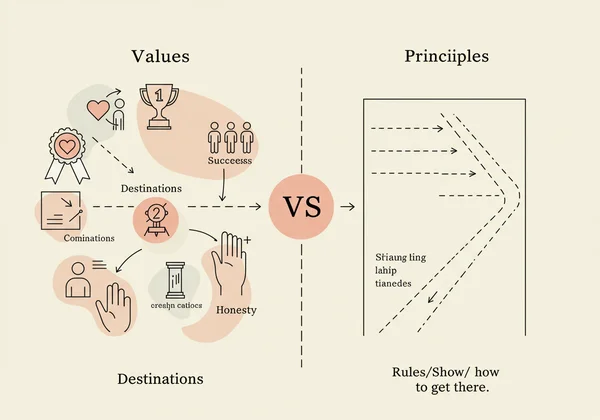5 Basic Moral Principles: Your Guide to Everyday Ethics
Navigating the complexities of life can often feel like sailing in murky waters without a map. We face countless decisions every day, from small interactions to major life choices, each guided by an invisible force: our moral compass. But how do we calibrate this internal guide? Understanding the basic moral principles that underpin ethical behavior is the first step toward clarity and self-awareness. But What is a moral test? It's a tool designed to help you explore the very framework of your decision-making, offering insights into the principles you prioritize.
At its core, understanding ethics is about building a more conscious and intentional life. It's about moving from simply reacting to situations to responding with a clear sense of your values. This guide will demystify five foundational moral principles that are universally relevant, providing you with a practical framework for your everyday life. By exploring these concepts, you can begin to see your own choices more clearly and discover your ethical core.

Unpacking the Core: What Are Moral Principles?
Think of moral principles as the fundamental beliefs that act as the foundation for your ethical code. They are not just fleeting opinions; they are the sturdy pillars that support your judgments about right and wrong. These principles provide consistency and reliability to our moral reasoning, helping us navigate complex situations where the "right" choice isn't immediately obvious. They are the 'why' behind our ethical decisions.
To truly grasp their power, it's essential to understand how they relate to our values. While often used interchangeably, they serve different functions in our moral landscape.
Defining Your Ethical Compass: Values vs. Principles
Your ethical compass is shaped by both values and principles, but they play distinct roles. Values are the concepts or ideals that you deem important, such as honesty, compassion, or success. They are the destinations on your moral map. Principles, on the other hand, are the specific rules or standards of conduct that guide your journey toward those destinations.
For example, if you hold the value of honesty, you might live by the principle of "always tell the truth, even when it's difficult." Your values are the 'what,' while your principles are the 'how.' Understanding both is crucial for building a coherent moral identity, and a great way to start is with a free ethical compass test.

The 5 Basic Moral Principles Explained
While philosophers have debated ethics for centuries, several core principles have emerged as nearly universal guides for human conduct, particularly in professional fields like medicine and psychology. These five principles offer a robust framework for evaluating actions and making sound moral judgments.
Autonomy: The Right to Self-Determination
The principle of autonomy recognizes the inherent right of every individual to make their own choices and decisions about their life, as long as those choices do not infringe upon the rights of others. It’s about respecting a person's capacity for self-governance.
In practice, this means allowing others the freedom to hold their own opinions, make their own mistakes, and live according to their own values. In a conversation, it’s about listening to understand rather than to persuade. In leadership, it's about empowering your team members to take ownership of their work. Respecting autonomy is fundamental to fostering relationships built on trust and mutual respect.
Justice: Fairness and Equality for All
Justice is the principle of fairness. It demands that we treat all individuals equitably and without prejudice. This doesn't necessarily mean treating everyone the same, but rather providing people with what they are due based on fair and impartial criteria. It encompasses ideas of equality, impartiality, and the equitable distribution of resources and opportunities.
In daily life, practicing justice might look like a manager evaluating all team members using the same performance metrics or a parent dividing chores evenly among their children. It’s about consciously working to eliminate personal biases from your decisions and advocating for systems that are fair for everyone.
Beneficence: Doing Good and Preventing Harm
Beneficence is the active principle of doing good. It goes beyond simply avoiding harm and calls on us to contribute positively to the welfare of others. It is the moral impulse that drives us to help someone who has fallen, offer support to a grieving friend, or volunteer our time for a cause we believe in.
This principle encourages proactive kindness and compassion. It’s about asking, "How can my actions improve this situation or help this person?" Cultivating beneficence means looking for opportunities, however small, to make a positive impact on the world around you and add to the well-being of your community.
Non-maleficence: The Imperative to Do No Harm
As the counterpart to beneficence, the principle of non-maleficence is the fundamental duty to avoid causing harm to others. This is often summarized by the classic phrase, "First, do no harm." Harm can be physical, emotional, or psychological, and this principle compels us to consider the potential negative consequences of our actions before we take them.
This principle is a cornerstone of professional ethics, from medicine to business. It means ensuring products are safe, information is handled securely, and words are chosen carefully to avoid causing unnecessary pain. In our personal lives, it's about refraining from gossip, acting with consideration, and being mindful of our impact on others' feelings.
Fidelity: Upholding Trust and Loyalty
The principle of fidelity revolves around trust, loyalty, and keeping promises. It is the ethical obligation to be reliable, honor our commitments, and be faithful to the people and duties we have accepted. When you make a promise, fidelity is the principle that guides you to keep it.
This is the glue that holds relationships and societies together. It’s demonstrated when a professional maintains client confidentiality, when a friend keeps a secret, or when an employee fulfills their job responsibilities. Acting with fidelity builds a reputation for integrity and trustworthiness, which are essential for any meaningful personal or professional connection. Discovering how you balance this with other principles can be a fascinating journey, one that you can start by taking a moral values test.
Applying Moral Principles in Your Everyday Life
Understanding these principles is one thing; applying them is another. The real challenge lies in using them to navigate the gray areas of daily life, where principles can sometimes conflict with one another.
Recognizing Ethical Dilemmas
An ethical dilemma occurs when you find yourself in a situation where two or more moral principles are in conflict, and satisfying one means violating another. For example, a doctor's duty of beneficence (wanting to give a patient hope) might conflict with the principle of autonomy and fidelity (the duty to tell the patient the full truth about a grim diagnosis).
Recognizing these dilemmas is the first step toward resolving them thoughtfully. It requires you to pause, identify which principles are at play, and weigh the potential consequences of each possible action. There often isn't a single "perfect" answer, but a structured approach can lead to a more ethical one.

Cultivating Your Ethical Core
Strengthening your moral compass is an ongoing process of personal growth. It requires consistent self-reflection and practice. Start by asking yourself questions at the end of the day: "When did I face a moral choice today? Which principles guided my decision? Could I have acted differently?"
Engaging in these reflections helps build moral awareness. Another powerful tool is to explore where you stand right now. A well-designed moral assessment test can provide a structured snapshot of your ethical tendencies, offering personalized insights that serve as a starting point for deeper self-improvement.
Begin Your Ethical Self-Discovery Today
The five basic moral principles—Autonomy, Justice, Beneficence, Non-maleficence, and Fidelity—are more than just abstract concepts. They are practical tools for building a life of integrity, purpose, and stronger relationships. By understanding them, you can navigate ethical dilemmas with greater confidence and cultivate a deeper sense of self-awareness.
The journey to moral clarity is unique for everyone. It begins with curiosity and a willingness to explore your inner world. If you're ready to see how these principles manifest in your own decision-making, we invite you to take the next step. Start Your Free Moral Test Now to gain personalized insights into your ethical core and begin a rewarding journey of self-discovery.
FAQ Section
What are the 5 moral values commonly recognized?
The five commonly recognized ethical principles, especially in fields like bioethics, are Autonomy (respect for self-determination), Justice (fairness and equality), Beneficence (acting to do good), Non-maleficence (avoiding harm), and Fidelity (trustworthiness and loyalty). These principles provide a comprehensive framework for ethical decision-making.
How can I tell if someone is moral based on these principles?
You can observe someone's morality by noticing how consistently their actions align with these principles. Do they respect others' choices (Autonomy)? Do they act fairly (Justice)? Do they actively try to help others (Beneficence) while avoiding causing harm (Non-maleficence)? Are they trustworthy and reliable (Fidelity)? A moral person demonstrates a consistent pattern of behavior that reflects these ethical foundations.
What is the difference between ethics and morals?
While closely related, morals typically refer to an individual's personal beliefs about right and wrong, shaped by their upbringing, culture, and experiences. Ethics refers to a broader set of principles or a code of conduct that a group or society adheres to, such as medical ethics or legal ethics. In essence, morals are personal, while ethics are more communal or professional.
How do I identify my own moral values and principles?
Identifying your values involves self-reflection. Ask yourself what is most important to you in life, what you stand for, and what lines you will not cross. Consider past decisions and what motivated them. A great way to accelerate this process is to use a structured tool designed for this purpose. An online moral alignment test can help you uncover your core principles by presenting you with scenarios that challenge your thinking.
Is taking a moral test a good way to understand my principles?
Absolutely. While no test can definitively label you, a scientifically-designed moral test is an excellent tool for self-reflection. It provides objective, data-driven insights into your decision-making patterns and highlights which ethical principles you tend to prioritize in complex situations. It serves as a valuable starting point for deeper personal growth and understanding your unique ethical compass.